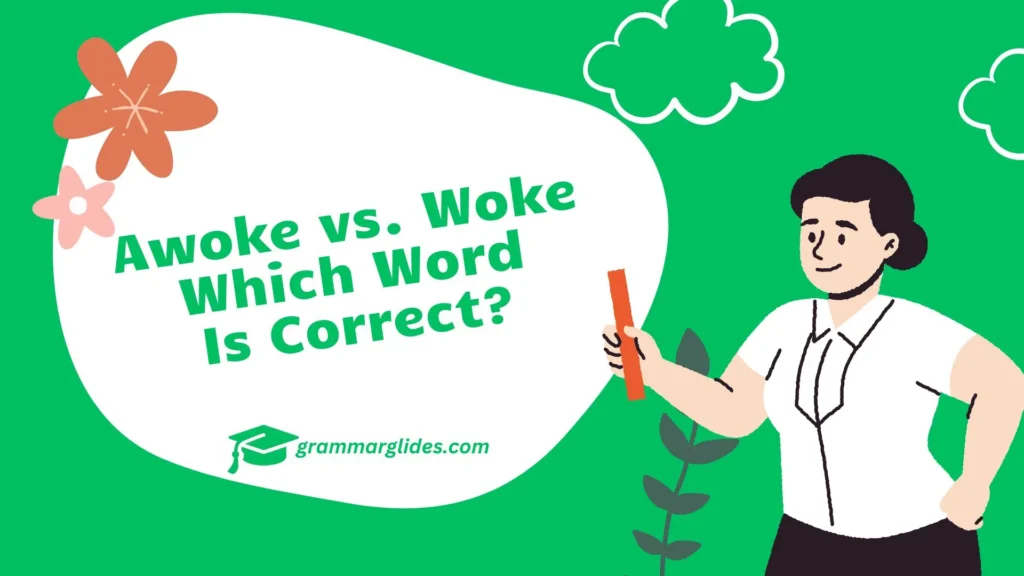“Understanding the difference between ‘Awoke’ and ‘Woke’ is key to clear communication and cultural awareness.”
Language constantly evolves, introducing nuances and shifts in how we use words. Among such terms, “Awoke” and “Woke” have drawn significant attention due to their linguistic and cultural relevance. While both originate from the same root, their meanings and applications differ significantly in today’s conversations.
When choosing the right term between “Awoke” and “Woke”, understanding their meanings, origins, and appropriate usage is essential. Whether you are writing a formal piece or engaging in modern cultural discussions, selecting the correct term enhances your clarity and intent.
This guide explains the history, definitions, and usage of “Awoke” and “Woke”, offering practical insights to make informed word choices. Let’s explore these terms to understand their roles in language and culture.
Overview
The terms “Awoke” and “Woke” share etymological roots but serve distinct functions in language. “Awoke” is the past tense of the verb “awake” and relates to the act of waking up from sleep, often used in formal or literary contexts. In contrast, “Woke” has expanded into a cultural term symbolizing social awareness and activism. This article explores their historical contexts, cultural impact, and modern usage to clarify when and how to use each word effectively.
Historical Context
Origins of “Woke”
“Woke” originated in African American Vernacular English (AAVE) during the early 20th century. Initially, it referred to being alert or aware of injustices, particularly regarding racial and social issues. Over time, its use expanded to represent broader social consciousness.
Scenario: During the Civil Rights Movement, activists encouraged people to “stay woke” to systemic injustices and discrimination.
Origins of “Awoke”
“Awoke” stems from Old English roots, serving as the simple past tense of “awake.” Traditionally, it described the literal act of waking up or becoming alert. Over centuries, it has retained its grammatical and literal functions without significant cultural reinterpretation.
Scenario: A literary passage might read, “She awoke to the sound of birdsong,” showcasing its classical usage.
Definitions and Modern Usage
“Woke”
“Woke” now symbolizes a heightened awareness of social and political issues, especially in the context of equality and justice. While its core remains tied to awareness, it has also faced criticism for being overused or misinterpreted.
Example:
- “She is woke to environmental concerns and actively supports green initiatives.”
- “The movement urged citizens to stay woke about voting rights.”
- “Being woke means recognizing privilege and advocating for fairness.”
“Awoke”

“Awoke” remains a straightforward verb describing the action of waking up. Its modern usage is mainly formal or literary.
Example:
- “He awoke early to prepare for the meeting.”
- “The village awoke to the sound of celebration.”
- “As dawn broke, she awoke with a sense of hope.”
Key Differences Between “Awoke” and “Woke”
| Aspect | Awoke | Woke |
| Definition | Past tense of the verb “awake,” meaning to wake up or regain consciousness. | Symbol of social and cultural awareness, often tied to activism and justice. |
| Context | Used in formal, literary, or descriptive narratives. | Common in informal, cultural, and social discussions. |
| Cultural Significance | Minimal; primarily grammatical. | Significant; represents social consciousness and awareness of systemic issues. |
| Tone | Formal and traditional. | Informal and modern. |
| Usage Examples | “She awoke to the sound of birds.” | “He is woke to the struggles of marginalized communities.” |
| Origins | Derived from Old English; tied to the literal act of waking up. | Originated in African American Vernacular English; metaphorical awakening. |
| Misuse | Misused in casual speech, making sentences sound overly formal. | Misused or overused in political or marketing contexts. |
Context of Use
- “Awoke” refers to literal waking or becoming conscious, fitting well in formal writing or storytelling.
- “Woke” symbolizes a metaphorical awakening tied to cultural awareness and activism.
Cultural Impact
“Woke” has become a symbol of progressive ideals, often associated with movements advocating equality. However, it has also sparked debates about its overuse or commercialization.
Scenario: A public speaker emphasized staying woke about global climate change, encouraging the audience to act responsibly.
Social Perception and Evolution of “Woke”
“Woke” has evolved from a term rooted in activism to a mainstream cultural buzzword. Social perception of the term often depends on its context and the speaker’s intent. While some embrace it as a symbol of awareness, others see it as overused or politically charged.
- Example 1: A community leader encourages staying “woke” to environmental issues by adopting sustainable practices.
- Example 2: Critics argue that certain brands misuse “woke” for marketing without meaningful actions.
- Example 3: A student activist describes their journey of becoming “woke” about systemic inequalities in education.
Professional Settings for “Awoke”
“Awoke” frequently appears in formal settings such as academic writing, legal documents, or professional reports. Its clarity and grammatical precision make it ideal for conveying actions in past tense.
- Example 1: “The team awoke to the challenges of meeting the tight deadline.”
- Example 2: “During the conference, she awoke to the need for better communication skills.”
- Example 3: “He awoke to the importance of balancing work and mental health after the workshop.”
Cultural Reinterpretations of “Woke”
As “woke” gained popularity, it also underwent reinterpretation in various cultures. In some cases, it retains its original activist meaning, while in others, it becomes a trendy or ironic term.
- Example 1: In art circles, “woke” themes highlight social justice issues through creative mediums.
- Example 2: On social media, “woke” is used both sincerely and sarcastically, depending on the user’s tone.
- Example 3: An international documentary explores how the term “woke” is understood differently across regions.
Literary Use of “Awoke” in Symbolism
In literature, “awoke” is often used symbolically to represent enlightenment, realization, or an emotional awakening. This usage adds depth and layers to storytelling.
- Example 1: “She awoke to the realization that love had always been there, waiting in the shadows.”
- Example 2: “The character awoke from his apathy, ready to fight for justice.”
- Example 3: “As the sun rose, he awoke with a newfound sense of purpose.”
“Is ‘In Memoriam’ or ‘In Memory’ Correct?”
Debates Around “Woke” Terminology
The term “woke” has sparked debates over its relevance, overuse, and implications. While advocates appreciate its role in raising awareness, critics argue that it is sometimes used performatively.
- Example 1: A panel discussion highlights the pros and cons of using “woke” in educational curricula.
- Example 2: A satire column pokes fun at companies claiming to be “woke” without actionable efforts.
- Example 3: A cultural critique examines how “woke” influences modern media narratives.
Grammatical Precision in Using “Awoke”
Proper use of “awoke” requires attention to grammar rules, particularly in distinguishing it from “awakened.” Misuse can lead to confusion, especially in formal writing.
- Example 1: Correct: “He awoke to the sound of thunder.” Incorrect: “He was awoke by thunder.”
- Example 2: Correct: “They awoke early to prepare for the trip.” Incorrect: “They awoke by the morning light.”

- Example 3: Correct: “She awoke feeling refreshed after a good night’s sleep.”
Subcultural Adoption of “Woke”
Different subcultures adopt “woke” to address specific issues, making it a versatile term that varies in meaning across groups.
- Example 1: In LGBTQ+ communities, “woke” highlights awareness about gender identity and inclusivity.
- Example 2: Environmental groups use “woke” to rally support for climate action and sustainable living.
- Example 3: Music artists incorporate “woke” themes to address social inequality in their lyrics.
Philosophical Implications of “Awoke”
Beyond its literal meaning, “awoke” can imply a philosophical or spiritual awakening, often used in discussions about mindfulness and self-awareness.
- Example 1: “The retreat participant awoke to the interconnectedness of all life.”
- Example 2: “After years of reflection, she awoke to the realization of her life’s purpose.”
- Example 3: “He awoke to the importance of living in the present moment.”
Comparative Popularity Over Time
“Woke” and “awoke” have experienced shifts in popularity, influenced by cultural trends and linguistic evolution. Modern usage favors “woke” in informal settings, while “awoke” retains its place in traditional contexts.
- Example 1: A Google Trends analysis shows a spike in searches for “woke” during major social movements.
- Example 2: “Awoke” appears more frequently in historical and academic texts.
- Example 3: Social media discussions often center on “woke,” reflecting its contemporary resonance.
Practical Applications in Communication
Understanding the appropriate use of “awoke” and “woke” enhances clarity and credibility in communication. Choosing the right term depends on context and audience.
- Example 1: Use “awoke” in formal emails: “I awoke to the urgency of addressing this issue.”
- Example 2: Use “woke” in casual discussions: “She is so woke about workplace diversity.”
- Example 3: Use both correctly: “He awoke to the problem, and now he stays woke to its solutions.”
Examples of “Woke” in Media and Society
Positive Examples
- A nonprofit campaign promoting literacy describes its mission as “woke to the barriers faced by underserved communities.”
- Social media hashtags like #StayWoke highlight awareness campaigns for social justice.
- Educational programs use the term to inspire students to question systemic inequalities.
Controversial Examples
- Critics argue that “woke” is sometimes weaponized for political purposes.
- Overuse in marketing campaigns can dilute its original meaning.
- Some believe labeling individuals as “woke” creates unnecessary divisions in discussions.
Examples of “Awoke” in Literature and Everyday Use
Historical and Literary Examples
- Shakespeare’s works often use terms like “awoke” in poetic descriptions of characters regaining consciousness.
Example: “He awoke from his reverie, startled by the thunder.”
Modern Usage
- In formal contexts, “awoke” appears in essays or descriptive narratives.
Example: “She awoke to the beauty of the sunrise, feeling at peace.”
Misunderstandings and Misuses
Misunderstandings of “Woke”
- Many associate “woke” solely with political ideologies, overlooking its deeper roots in awareness and activism.
Scenario: A colleague misinterpreted “woke” as a trendy buzzword rather than a meaningful term rooted in activism.
Misuses of “Awoke”
- Using “awoke” incorrectly in informal contexts can make the sentence sound overly formal or awkward.
Example: Incorrect: “He awoke to the idea of becoming a chef.” Correct: “He realized he wanted to become a chef.”
FAQs
What does “woke” mean in modern language?
“Woke” refers to being socially and politically aware, particularly about issues like inequality and justice.
Is “awoke” still used in conversation?
Yes, but it is more common in formal writing or literary contexts than in everyday speech.
Can “woke” and “awoke” be used interchangeably?
No, “woke” relates to awareness, while “awoke” is a past tense verb referring to waking up.
Why is “woke” controversial?
The term has been politicized, with supporters praising its advocacy for justice and critics arguing it’s overused or misapplied.
Which term is more formal, “woke” or “awoke”?
“Awoke” is more formal and typically used in traditional writing, while “woke” has a modern, informal tone.
Wrap Up
Understanding the differences between “Awoke” and “Woke” enriches your language skills and cultural literacy. While “Awoke” serves as a traditional verb with a straightforward meaning, “Woke” has transcended its roots to become a cultural symbol of awareness and activism.
Choosing the correct term depends on context—whether you are crafting a literary piece or participating in contemporary discussions. Awareness of these nuances not only enhances communication but also fosters respect for the dynamic nature of language.

Hi! I’m Lauren Reynolds, the author of Grammar Glides. I create easy-to-follow content that helps you master English with confidence. Let’s make learning English simple and enjoyable together!

